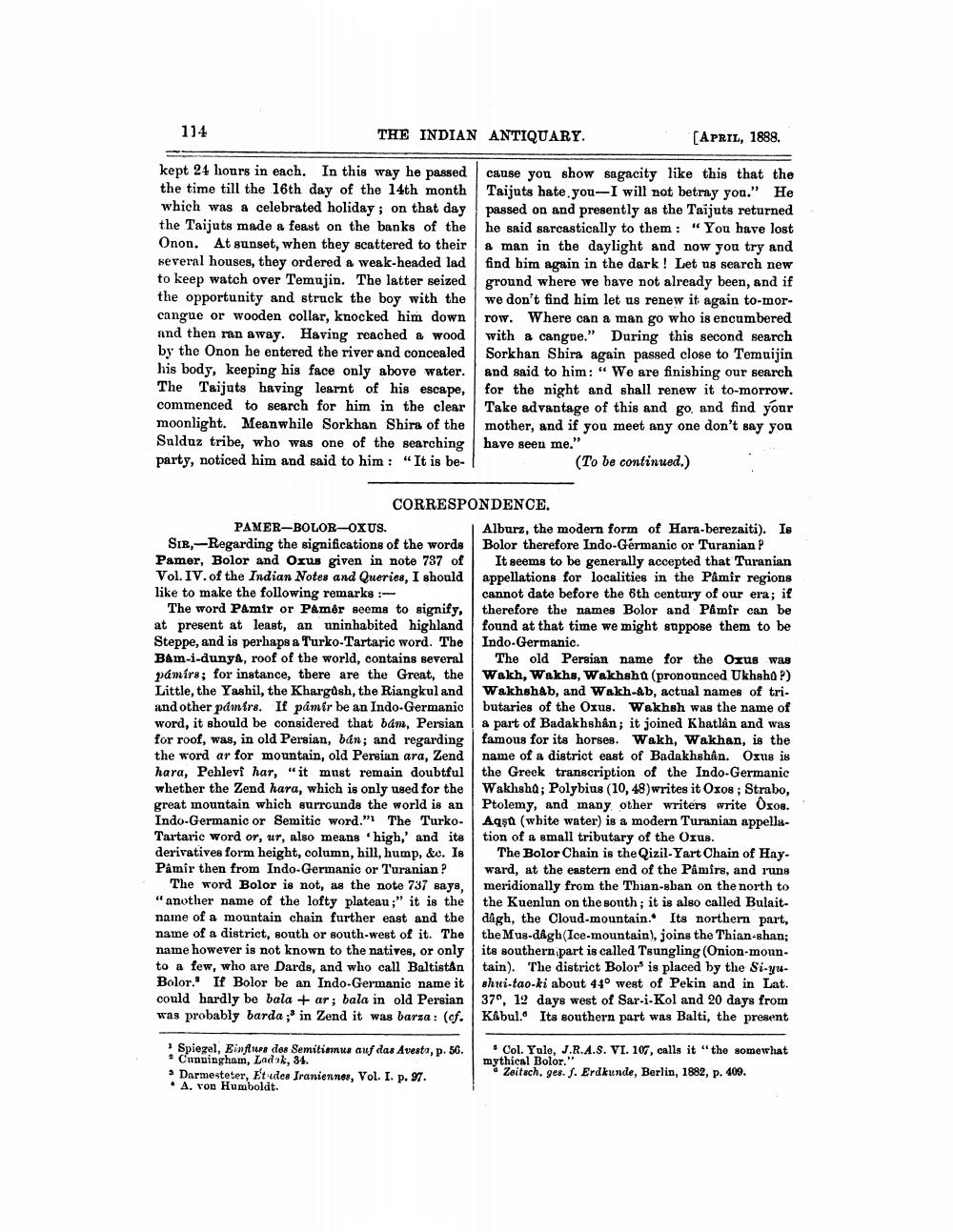________________
114
THE INDIAN ANTIQUARY.
[APRIL, 1888.
kept 24 hours in each. In this way he passed the time till the 16th day of the 14th month which was a celebrated holiday ; on that day the Taijuts made a feast on the banks of the Onon. At sunset, when they scattered to their several houses, they ordered a weak-headed lad to keep watch over Temujin. The latter seized the opportunity and struck the boy with the cangue or wooden collar, knocked him down and then ran away. Having reached a wood by the Onon he entered the river and concealed his body, keeping his face only above water. The Taijuts having learnt of his escape, commenced to search for him in the clear moonlight. Meanwhile Sorkhan Shira of the Sulduz tribe, who was one of the searching party, noticed him and said to him: "It is be
cause you show sagacity like this that the Taijuts hate you--I will not betray you." He passed on and presently as the Taijuts returned he said sarcastically to them: "You have lost a man in the daylight and now you try and find him again in the dark! Let us search new ground where we have not already been, and if we don't find him let us renew it again to-morrow. Where can a man go who is encumbered with a cangue." During this second search Sorkhan Shira again passed close to Temuijin and said to him: “ We are finishing our search for the night and shall renew it tomorrow. Take advantage of this and go, and find your mother, and if you meet any one don't say you have seen me."
(To be continued.)
CORRESPONDENCE. PAMER-BOLOR-OXUS.
Alburz, the modern form of Hara-berezaiti). Ie SIR, -Regarding the significations of the words Bolor therefore Indo-Germanic or Turanian Pamer, Bolor and Oxus given in note 737 of It seems to be generally accepted that Turanian Vol. IV. of the Indian Notes and Queries, I should appellations for localities in the Påmir regions like to make the following remarks :
cannot date before the 6th century of our era; if The word Pamir or Pamer seems to signify, therefore the names Bolor and Pamir can be at present at least, an uninhabited highland found at that time we might suppose them to be Steppe, and is perhaps a Turko-Tartaric word. The Indo-Germanic. Bam-i-dunya, roof of the world, contains several The old Persian name for the Orus was pámírs; for instance, there are the Great, the Wakh, Wakhs, Wakhsha (pronounced Ukhsho?) Little, the Yashil, the Khargüsh, the Riangkul and Wakhshab, and Wakh-Ab, actual names of triand other pamirs. If pámír be an Indo-Germanic butaries of the Oxus. Wakhsh was the name of word, it should be considered that bám, Persian a part of Badakhshân; it joined Khatlån and was for roof, was, in old Persian, bán; and regarding famous for its horses. Wakh, Wakhan, is the the word ar for mountain, old Persian ara, Zend name of a district east of Badakhshän. Oxus is hara, Pehlevi har, “it must remain doubtful the Greek transcription of the Indo-Germanic whether the Zend hara, which is only used for the Wakhsha; Polybius (10,48) writes it Oxos; Strabo, great mountain which surrounds the world is an Ptolemy, and many other writers write Oxos. Indo-Germanic or Semitic word." The Turko- Aqşu (white water) is a modern Turanian appellaTartaric word or, ur, also means high,' and its tion of a small tributary of the Osus. derivatives form height, column, hill, hump, &o. Is The Bolor Chain is the Qizil-Yart Chain of Hay. Pamir then from Indo-Germanic or T'uranian? ward, at the eastern end of the Påmirs, and runs
The word Bolor is not, as the note 737 says, meridionally from the Thian-sban on the north to "another name of the lofty plateau ;" it is the the Kuenlun on the south; it is also called Bulaitname of a mountain chain further east and the dagh, the Cloud-mountain.• Its northern part, name of a district, south or south-west of it. The the Mus-dagh (Ice-mountain), joins the Thian-shan; name however is not known to the natives, or only its southern part is called Tsungling (Onion-moun. to a few, who are Dards, and who call Baltistan tain). The district Bolor is placed by the Si-yuBolor.' It Bolor be an Indo-Germanic name it shui-tao-ki about 44° west of Pekin and in Lat. could hardly be bala + ar; bala in old Persian 37o, 12 days west of Sar-i-Kol and 20 days from was probably barda ;' in Zend it was barza : (cf. Kabul. Its southern part was Balti, the present
Spiegel, Einflus des Semitianus auf das Avesta, p. 56. * Cunningham, Ladok, 84. 3 Dormesteter, Et des Iraniennes, Vol. I. p. 97. • A. von Humboldt.
. Col. Yulo, J.R.A.S. VI. 107, calls it "the somewhat mythical Bolor."
Zeitach. ges. J. Erdkunde, Berlin, 1882, p. 409.




